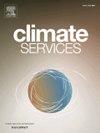A content analysis of actionable guidelines for Climate-Smart agriculture implementation in South Africa- communication for behavioral changes
IF 4
3区 环境科学与生态学
Q2 ENVIRONMENTAL SCIENCES
引用次数: 0
Abstract
The actionable guidelines for climate-smart agriculture were developed as advisory and prescriptive activities to promote the adoption of climate-smart agriculture techniques. The coverage of the guidelines aligns with the agroecological principles which serve as the foundation for cleaner production. The content analysis explored the nexus between cleaner production- agroecological principles and climate-smart agriculture, by examining the scope and intensity of coverage of agroecological principles through the perspectives of extended parallel process, construal level theory, and information deficit model by the actionable guidelines. The results reinforce the non-mutual exclusivity and exhaustivity among the three concepts due to the overlapping of the practice and knowledge of the concepts; and that the communication of any of the concepts inadvertently covers the other in a way that coherence, complementarity, and coordination have been established. The communication in the actionable guidelines emphasizes the intention for desired results, current activities needed to be implemented, implementation steps rather than the danger posed by climate change, and future implications and theoretical issues as often with climate change reports and communication outlets. The practical implication of the findings is that communication on climate change should not be overtly scientific if it is to elicit behavioral change and that the efficacy of the communication outlets should be evaluated for effectiveness.
南非气候智能型农业实施可操作指南的内容分析--传播促进行为改变
制定了气候智慧型农业可操作准则,作为促进采用气候智慧型农业技术的咨询和规范性活动。准则的范围与作为清洁生产基础的农业生态原则相一致。内容分析通过扩展平行过程、解释水平理论和可操作指南的信息赤字模型的角度考察了农业生态原则的覆盖范围和强度,探讨了清洁生产-农业生态原则与气候智能型农业之间的关系。由于概念的实践和知识的重叠,结果加强了三个概念之间的非互斥性和穷竭性;任何概念的交流都不经意地以一种一致性、互补性和协调性已经建立起来的方式覆盖了其他概念。可操作指南中的信息通报强调了预期结果的意图、当前需要实施的活动、实施步骤而不是气候变化带来的危险、以及气候变化报告和信息通报渠道经常提到的未来影响和理论问题。这些发现的实际含义是,如果要引起行为改变,关于气候变化的传播不应该过于科学,并且应该评估传播渠道的有效性。
本文章由计算机程序翻译,如有差异,请以英文原文为准。
求助全文
约1分钟内获得全文
求助全文
来源期刊

Climate Services
Multiple-
CiteScore
5.30
自引率
15.60%
发文量
62
期刊介绍:
The journal Climate Services publishes research with a focus on science-based and user-specific climate information underpinning climate services, ultimately to assist society to adapt to climate change. Climate Services brings science and practice closer together. The journal addresses both researchers in the field of climate service research, and stakeholders and practitioners interested in or already applying climate services. It serves as a means of communication, dialogue and exchange between researchers and stakeholders. Climate services pioneers novel research areas that directly refer to how climate information can be applied in methodologies and tools for adaptation to climate change. It publishes best practice examples, case studies as well as theories, methods and data analysis with a clear connection to climate services. The focus of the published work is often multi-disciplinary, case-specific, tailored to specific sectors and strongly application-oriented. To offer a suitable outlet for such studies, Climate Services journal introduced a new section in the research article type. The research article contains a classical scientific part as well as a section with easily understandable practical implications for policy makers and practitioners. The journal''s focus is on the use and usability of climate information for adaptation purposes underpinning climate services.
 求助内容:
求助内容: 应助结果提醒方式:
应助结果提醒方式:


